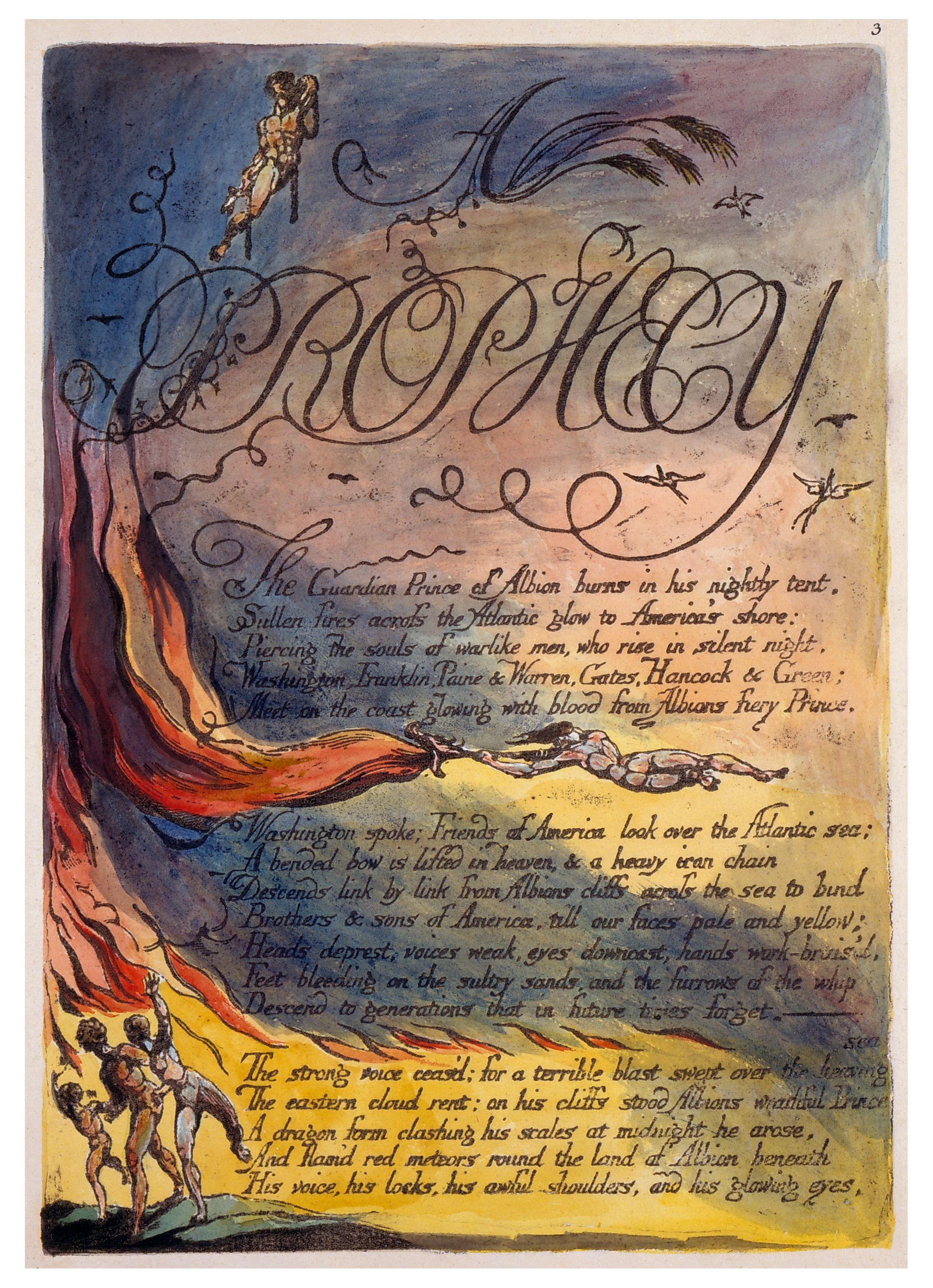America a Prophecy
Plate 3
 David V Erdman, author of Prophet Against Empire, speaking of the Blakes' situation in London quotes from one of Blake's letters and continues with a few words about the ambiance in the city:
David V Erdman, author of Prophet Against Empire, speaking of the Blakes' situation in London quotes from one of Blake's letters and continues with a few words about the ambiance in the city:"Here is the 'other' meaning of 'My wife continues poorly' and 'Everybody complains,' the sadness of an unemployed artist 'almost 50 Years of Age.' But these lines scarcely hint at what the experience is in 1803. They give no indication that London is fortified against invasion, that the Thames is filling with captured French ships, that the Tower and numerous workshops are busy turning out small arms night and day. Yet Blake did observe this daily cast of brazen cannon and hear ambassador and king call for war almost before the drying of signatures for peace. These woes are in his prophecies." (Page 395)
Jerusalem, Plate 65, (E 216)
"The sun was black & the moon rolld a useless globe thro Britain!
Then left the Sons of Urizen the plow & harrow, the loom
The hammer & the chisel, & the rule & compasses; from London fleeing
They forg'd the sword on Cheviot, the chariot of war & the battle-ax,
The trumpet fitted to mortal battle, & the flute of summer in Annandale
And all the Arts of Life. they changd into the Arts of Death in Albion.
The hour-glass contemnd because its simple workmanship.
Was like the workmanship of the plowman, & the water wheel,
That raises water into cisterns: broken & burnd with fire:
Because its workmanship. was like the workmanship of the shepherd.
And in their stead, intricate wheels invented, wheel without wheel:
To perplex youth in their outgoings, & to bind to labours in Albion
Of day & night the myriads of eternity that they may grind
And polish brass & iron hour after hour laborious task!
Kept ignorant of its use, that they might spend the days of wisdom
In sorrowful drudgery, to obtain a scanty pittance of bread:
In ignorance to view a small portion & think that All,
And call it Demonstration: blind to all the simple rules of life.
Now: now the battle rages round thy tender limbs O Vala
Now smile among thy bitter tears: now put on all thy beauty
Is not the wound of the sword sweet! & the broken bone delightful?"
Wilt thou now smile among the scythes when the wounded groan in the field[?]
We were carried away in thousands from London; & in tens
Of thousands from Westminster & Marybone in ships closd up:
Chaind hand & foot, compelld to fight under the iron whips
Of our captains; fearing our officers more than the enemy."
Blake saw the enemy not in France but in war itself which changed the arts of life (the productive arts of the imagination) to the arts of death (the destructive arts of taking life.)
4 comments:
right on, Ellie
"Blake saw the enemy not in France but in war itself which changed the arts of life (the productive arts of the imagination) to the arts of death (the destructive arts of taking life.)"
amen and amen --
I wonder if Blake had any patience with the approach of traditional Friends and others, of distinguishing between "inward" and "outward" war -- we are not to take up outward weapons, but there's a spiritual war underway which one denies at one's peril...
This post about the outward war with France is interesting, juxtaposed to Larry's about "kingdom"....
Post a Comment